By Christopher Zehnder
A profound tension between the movements of the heart and the demands of reason marks Dante Alighieri’s Divine Comedy. This tension is felt in passages describing the pity Dante feels for the damned in Hell. Should Dante feel such pity? In one passage in Canto XX of the Inferno, the answer to this question seems to be a definite no. Dante has passed into the Fourth Bolgia of the fraudulent, where the shades of fortune tellers and diviners appear to him “hideously distorted,” their faces so twisted on their necks that “the tears that burst from their eyes ran down the cleft of the buttocks.” Seeing “the image of our humanity distorted,” Dante is overcome with weeping, for which Virgil rebukes him.
“Still? Still like the other fools,” says the stern Mantuan poet, the personification of reason:
“… There is no place
for pity here. Who is more arrogant
within his soul, who is more impious
than one who dares to sorrow at God’s judgment?”
To Virgil, Dante’s fault is nothing small. He is not merely guilty of some little weakness but of the impiety of questioning God’s justice. Virgil does not say how Dante should respond to the sufferings of the damned. Should he rejoice at their sufferings or simply look on with indifference? Yet, it seems, for Virgil, pity has no place in Hell.
Virgil’s rebuke would seem to settle the question of the propriety of feeling pity for the damned. But only a few lines before Virgil’s rebuke, Dante appeals to the reader for understanding:
Reader, so may God grant you to understand
my poem and profit from it, ask yourself
how could I check my tears…
This is not the only place in the Inferno where Dante feels pity for the damned, nor where Virgil at least seems to countenance a more rigorous response. Yet, no where else does Virgil rebuke Dante for his pity; indeed, elsewhere in Hell, the Master not only commends attitudes consonant with pity but himself seemingly acts out of pity for the suffering souls.
That we may profit from Dante’s verse, it behoves us to seek a resolution to the dilemma — whether Dante’s responses of pity toward those suffering justly by God’s will were always or never proper. Or, perhaps they were proper sometimes but, other times, not? The question of pity here, however, resolves itself into a larger question. One may feel other emotions that seemingly suggest a desire contrary to God’s will — sorrow, for instance, when a loved one dies or fear in the face of certain suffering, or a longing to escape it. Thus, we are led to ask a broader question — do we show impiety when, in the face of God’s certain providence, we feel anything else but joy, or, at least, indifference?
To answer this question with the goal, hopefully, of understanding the Divine Comedy better by answering it, we shall examine what Thomas Aquinas teaches about the proper relation of the passions to the will, and of both to reason. We shall ask whether Aquinas’ account resolves the dilemma posed by the Divine Comedy. We shall also look at an account of the relation of the emotions to the intellect and the will given by the 20th century philosopher, Dietrich von Hildebrand, as a possible way of understanding the problem posed by Virgil’s stern “how dare you” and Dante’s plaintive “how could I not?”
And all the while one spirit uttered this,
The other one did weep so, that, for pity,
I swooned away as if I had been dying,
And fell, even as a dead body falls.
(Inferno, Canto V, 139-143)1
Here, in the circle of the carnal sinners, Dante first feels pity in Hell. It is a dramatic moment. Francesca has told the story of how she and her lover, Paolo, fell into the sin that damned them:
“When as we read of the much-longed-for smile
Being by such a noble lover kissed,
This one, who ne’er from me shall be divided,
Kissed me upon the mouth all palpitating.
Galeotto was the book and he who wrote it.
That day no farther did we read therein.”
The reader, I think, can well understand Dante’s dismay, his overwhelming pity. It is the supreme irony — that the love of desire that promises so much joy and content could lead to eternal sorrow. Moreover, Dante sees that, of their own choosing, Paolo and Francesca are enmeshed in a union of eternal pain. Their longed-for union has become a torment for them.
Yet, despite their sin, Dante describes the lovers in the gentlest terms; he speaks of them as “those two swept together so lightly on the wind and still so sad.” When he beckons them, they hasten to him “as mating doves that love calls to their nest.” Such passages, of course, are ironic; yet, they bespeak the tender pity Dante feels for Francesca and Paolo — a pity, coupled with the confusion that he has already expressed for “the great knights and ladies of dim time” he beheld in that Second Circle of Hell.
If Dante had at this point defend himself with the words, “Reader … ask yourself how could I check my tears…,” we would be as hard pressed to gainsay him. Yet, Dante does not offer any defense, for he has suffered no rebuke from Virgil. Not only in the first five circles — where the incontinent are punished — but within the city of Dis itself, Dante feels pity for the damned, without suffering any check from his master and guide. In the Sixth Circle of the heretics, for instance, Dante feels regret for failing to tell Cavalcante dei Cavalcanti that his son still lived (Canto X, 106-107).
Likewise, in the Seventh Circle, where the suicides suffer, Dante responds to a cry for pity from a soul encased in a thorn bush from which Dante has plucked a small branch — “Why do you tear me? Is there no pity left in any soul?” (Canto XIII, 35-36). Here even Virgil himself responds to the soul’s plaint with what seems to be pity, saying he himself had urged Dante “on to do what grieves me now” (lines 51-52). And when Dante says, in reference to this sinner, “such compassion chokes my heart,” Virgil does not scold. Instead, he urges the sinner to tell the secrets of his punishment so that “this man may with all his heart do for you what your words entreat him to” — that is, vindicate his memory before men (lines 85-87, 77).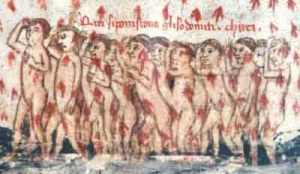
We needn’t multiply instances of Dante’s pity in the Inferno, yet, we cannot pass in silence Dante’s meeting with his teacher, Ser Brunetto Latini, in the circle of the burning sands. We cannot fail to detect Dante’s sorrow in the laconic “Ser Brunetto, are you here?” (Canto XV, 30). Nor can we fail to see Dante’s reverence for the man who, though a sodomite, was yet the master who taught him “how man makes himself eternal” (line 84):
I did not dare descend to his own level
but kept my head inclined, as one who walks
in revererence meditating good and evil.
(Inferno, Canto XV, 43-45)
Such reverence indicates Dante’s capacity to see what is noble and even venerable through the scorched features that are the plume of Ser Brunetto’s sin. Such reverence and gratitude for the “gentle and paternal” Brunetto create the ground for Dante’s pity, which, though not spoken, radiates from the lines of Canto XV. Virgil does not rebuke Dante’s regard for Brunetto. Indeed, Virgil himself enjoins a like reverence toward other souls on the burning sands:
…“Do as they ask,” he said,
“for these are souls to whom respect is due;
and were it not for the daring flames that hem
our narrow passage in, I should have said
it were more fitting you ran after them.”
(Inferno, Canto XVI, 14-18)
And, earlier, for Farinata, “who seemed to hold all Hell in disrespect,” Virgil had enjoined respect, saying to Dante, “Mind how you speak to him.” (Canto X, 34-39).
Yet pity is not Dante’s only reaction to the damned. At times he shows a marked indignation. One notable instance occurs in the Ninth Circle where Dante grabs the “dog’s-ruff” of Bocca degli Abbati’s hair and pulls out fistfuls of it to get him to reveal his name. But more significant is the incident in Canto VIII (lines 31-57) where Dante meets the soul of Filippo Argenti wallowing in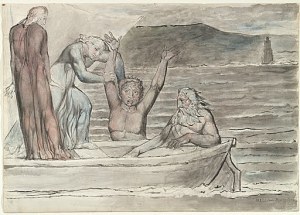 the filthy pitch of Styx. When Filippo addresses Dante, asking his name, the poet replies with a question of his own: “’But you, who are you, so fallen and so foul?’”
the filthy pitch of Styx. When Filippo addresses Dante, asking his name, the poet replies with a question of his own: “’But you, who are you, so fallen and so foul?’”
“And he: ‘I am one who weeps.’”
But this plaintive reply does not move Dante. He knows Argenti and turns on him savagely:
“May you weep and wail to all eternity,
for I know you, hell-dog, filthy as you are.”
Argenti grabs at the boat on which Dante and Virgil cross the swamp, but Virgil thrusts him back, commanding, “Down! Down! With the other dogs!” Then Virgil turns to Dante and embraces him, saying:
“Indignant spirit, I kiss you as you frown.
Blessed be she who bore you. In world and time
This one was haughtier yet. Not one unbending
graces his memory. Here is his shadow in slime.”
Yet, all this is not enough for the indignant Dante. He tells Virgil he wishes to see Argenti “scrubbed down into the swill.” And Virgil replies, “This is a wish that should be gratified.” And Providence, it seems, gratifies it:
And shortly after, I saw the loathsome spirit
So mangled by a swarm of muddy wraiths
That to this day I praise and thank God for it.
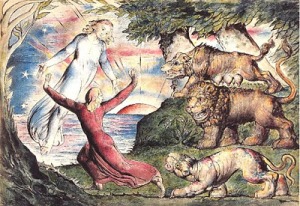 Pity and indignation, however, are not the only reponses in Hell to the plight of the damned. There is a third, shown neither by Dante the living man nor the shade Virgil who, though dead, still reacts with the passions of the living. We see this third response first when Virgil recounts Beatrice’s descent into Limbo. To his question how one so blessed as she dare venture into the abyss, Beatrice replies:
Pity and indignation, however, are not the only reponses in Hell to the plight of the damned. There is a third, shown neither by Dante the living man nor the shade Virgil who, though dead, still reacts with the passions of the living. We see this third response first when Virgil recounts Beatrice’s descent into Limbo. To his question how one so blessed as she dare venture into the abyss, Beatrice replies:
I am so made by God’s all-seeing mercy
your anguish does not touch me, and the flame
of this great burning has no power upon me.
(Canto II, 91-93)
We see a similar response in Canto IX (70-99) when the angel descends into Hell to force open the gates of Dis for the poets: “Ah, what scorn breathed from that Angel-presence!” The angel’s scorn is directed at the demons who had insolently refused to give Virgil and Dante passage. As for the souls of the damned, the angel seems not to notice them; they scatter before him like frogs in a pond “before their enemy, the snake” (Sinclair translation). The angel ignores even the poets for, says Dante, “He did not speak to us, but went his way like one preoccupied.”
Dante and Virgil both show, at different times, pity and indignation; but what do we call the reponses of Beatrice and the angel to the sufferings of the damned? Indifference. The sufferings of the damned cannot touch them.
The Problem Restated
This brief survey of the instances of pity and indignation in the Inferno  suggests that an answer to the question we have proposed — do we show impiety when, in the face of God’s certain providence, we feel anything else but joy, or, at least, indifference? — is not easily answered from a study of the Divine Comedy by itself. We have seen several instances where Dante expresses pity without any rebuke from Virgil. Then we have seen how Virgil praises Dante’s indignation toward Filippo Argenti and rebukes him for showing pity at the sufferings of the magicians and necromancers. Then, there are the occasions where Virgil himself seems to countenance pity or, at least, respect for the damned. Finally, we have seen the blessed indifference of Beatrice and the angel to the suffering damned — a reaction that neither Virgil nor Dante show, much less counsel.
suggests that an answer to the question we have proposed — do we show impiety when, in the face of God’s certain providence, we feel anything else but joy, or, at least, indifference? — is not easily answered from a study of the Divine Comedy by itself. We have seen several instances where Dante expresses pity without any rebuke from Virgil. Then we have seen how Virgil praises Dante’s indignation toward Filippo Argenti and rebukes him for showing pity at the sufferings of the magicians and necromancers. Then, there are the occasions where Virgil himself seems to countenance pity or, at least, respect for the damned. Finally, we have seen the blessed indifference of Beatrice and the angel to the suffering damned — a reaction that neither Virgil nor Dante show, much less counsel.
In the face of Virgil’s rebuke, Dante asks us in Canto XX, “reader, how could I check my tears?” Our survey of the Inferno has given us no clear answer to this question. We must therefore look beyond the Divine Comedy to what might be called the “psychology” or “anthropology” of the 13th and 14th centuries, found in the Scholastic philosophy of the period, most particularly in the writings of St. Thomas Aquinas. Specifically, we must ask what pity is, what is its relation to indignation and indifference, and when and where it can and should be exercised. In answering these questions, we perhaps will be in a better position to understand Dante’s poem “and profit from it.”
Yet, a proper understanding of the nature of pity requires that we describe, albeit briefly, the Scholastic understanding of the nature of the passions and affections and their relation to the intellect and the will in man. It is to this broader consideration we now turn our attention.
The Little Kingdom of the Human Soul
Formavit Dominus Deus hominem pulverem de humo et inspiravit in nares eius spiraculum vitae, et factus est homo in animam viventem (Gn. 2,7). 2![]()
This verse encapsulates the Catholic conception of human nature. Man is the “dust of the earth” inspired with the “breath of life.” He is not an embodied spirit; rather, the unity of soul and body in man is so profound that, as the Catholic Church has taught, the soul ought to be considered the form of the body.3 When we speak of “form” in this context, we mean that which makes a being what it is essentially; man’s soul, thus, makes the material body what it is in its nature and gives it life.4 In turn, the body individuates the soul — which, considered in itself, is the universal form of human nature. In this way, a unique human person comes to be.5 Body and soul, a union of matter and an immaterial principle, make man.
Such an understanding of human nature justifies the Scholastic definition of man as “rational animal.” Like other animals, man has a body that grows by the assimilation of other creatures. He has senses by which he perceives the world that surrounds him. Like other animals, man not only perceives the external world but reacts to it by the stirring within him of what may be called feelings but which, in the tradition of Aquinas, have been called “passions” or “affections.”6 The passions or affections are rooted in what is called the “sensitive appetite,”7 for they respond to what the senses perceive either with bodily feelings of desire (love) or repulsion (hate). If a passion is merely one of love or hate, it is called “concupiscible.” If, however, one experiences a difficulty or hindrance to the fulfillment of his desire, the passion elicited is called “irascible.”8
What we have said thus far of man applies to beasts as well. Man’s immaterial nature, however, is expressed in the higher faculty of the intellect that, by a process called abstraction, draws from sensible forms the ideal forms of things without matter. The senses present particular objects, but the intellect perceives what things are in their nature, for its objects are universals. The senses present a phantasm to one’s interior comprehension; the intellect perceives what kind of being that phantasm represents.
 Moreover, by the senses, men and beasts perceive that which elicits a response of desire or repulsion; but by the intellect, men perceive a thing as good or evil. In the animal nature, the passions respond as it were automatically; the dog sees the beef steak and feels desire. By his intellect, however, man can understand an object as good and can compare it to other good objects and decide whether it ought to be pursued or avoided. The intellect can also perceive the means necessary to attain a good object. And just as the animal in man has an appetite, so the rational in man has its own appetite that moves him to attain a good by certain means. That appetite is the will.9
Moreover, by the senses, men and beasts perceive that which elicits a response of desire or repulsion; but by the intellect, men perceive a thing as good or evil. In the animal nature, the passions respond as it were automatically; the dog sees the beef steak and feels desire. By his intellect, however, man can understand an object as good and can compare it to other good objects and decide whether it ought to be pursued or avoided. The intellect can also perceive the means necessary to attain a good object. And just as the animal in man has an appetite, so the rational in man has its own appetite that moves him to attain a good by certain means. That appetite is the will.9
Such an understanding of man’s interior life immediately suggests a certain hierarchical ordering of man’s interior powers. The intellect, comprehending universal forms, is of greater nobility than the senses, which fix on particulars alone. The will, responding as it does to the good the intellect presents to it, is to be governed by the intellect as by a certain law. Further, since the will can choose between the alternative goods the intellect shows it, it is radically free, while the passions, left to themselves, act by a kind of necessity. If the passions direct the will, man’s higher faculties would serve his inferior capacities. A truly human act, therefore, is rooted in intellect as the directing principle; it begins in the will’s determination to pursue a good by particular means; and it finds its consummation in a movement of the sensual appetitite in accord with the will. A properly ordered soul would therefore feel no passion that is not commanded by the will or, at least, is not prohibited by it.10
The human person, thus, is like a little kingdom that, if it is to be properly ordered, must have a law (the intellect) by which an executive (the will) directs its subjects (the passions), which should respond dutifully to it.
End Notes
1. Longfellow translation
2. Catechismus Ecclesiae Catholicae, 362
3. Ibid. 365
4. Ibid.
5. S. Thomae Aquinatis, Opusculum De Ente et Essentia, II, 6
6. S. Thomae Aquinatis, Summa Theologica, I-II, Q. XXII, Art. II
7. Ibid. Art. III
8. Ibid. Q. XXIII, Art. I
9. Ibid. Q. III, Art. IV, Resp. ad 3
10. Ibid. Q. XXIV, Art. I
The Case of Pity
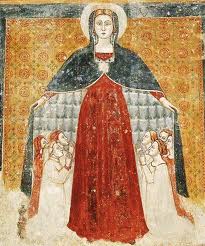 Pity is the name we give the passion or affection by which we, as it were, suffer with those who suffer. The Latin for our English word, pity, is very expressive; it is misericordia, derived from the words miseria (wretchedness, misery) and cor (the heart). Pity, then, is a certain sadness felt in the heart for another’s misery. It is a compassion, a suffering with another.
Pity is the name we give the passion or affection by which we, as it were, suffer with those who suffer. The Latin for our English word, pity, is very expressive; it is misericordia, derived from the words miseria (wretchedness, misery) and cor (the heart). Pity, then, is a certain sadness felt in the heart for another’s misery. It is a compassion, a suffering with another.
In his treatment of pity or misericordia (mercy), St. Thomas makes St. Augstin’s definition his own: Misericordia est alienae miseriae in nostro corde compassio, qua utique, si possimus, subvenire compellimur. 11 (“Mercy is the compassion in our heart for another’s misery by which, indeed, we are impelled to give succor, if we are able.”) According to this definition, pity or mercy has two aspects: it is an affective “suffering with” another, but it carries with it a desire or longing to relieve the suffering or misfortune that moves us. Without this desire to help, pity would be reduced to a weak self-indulgence — a muddy sentimentalism, a contraception of the heart.
If we understand Augustin’s definition of misericordia in light of St. Thomas’ understanding of man — that he is a material and immaterial creature — we will see that mercy or pity belongs not simply to the sensitive appetite but to the will as well. Indeed, for Aquinas, the heart (cor) refers primarily to the intellective appetite,12 and thus pity belongs first to the will. Yet, Aquinas does not make of pity merely a rational choice. Though, like other human appetites, it must be rooted in reason, pity will be the more perfect when it is expressed in the affections of the sensitive appetite, as long as these are governed by reason.13 Pity, which rises in the will, will find its consummation in the ought expression of the sensitive appetite.
It would be a mistake, however, to think that the only just affection is one that the will initiates. It is not the case that, in order to act justly, a man must feel nothing until his will commands him to feel it. For while it is true that, according to St. Thomas, a passion that precedes the determination of reason can cloud the mind’s perception of its object and so render a good act more difficult to perform,14 yet, as we have seen above, the just man can harbor those passions that are not commanded but are merely not prohibited by the will. Not every affection or passion that arises outside or alongside a specific command of the will is then inimical to the proper functioning of the human soul.
It is not immediately clear in St. Thomas how an affection that does not arise from the will’s command can be deemed a well  ordered passion; for, while such a passion might be in accord with the will — since it arises without the instigation of the will, it would seem not to bear the proper hierarchical orientation to the higher, intellective faculty. It would be like a soldier in battle who acts without regard to his general’s order to advance. Too, if we see the sensitive appetites as responding to sense objects, as the will does to the objects of the intellect, 15 then an appetite acting outside a specific command of the will would establish two directive principles in man: the intellect, on the one hand, and the senses, on the other.
ordered passion; for, while such a passion might be in accord with the will — since it arises without the instigation of the will, it would seem not to bear the proper hierarchical orientation to the higher, intellective faculty. It would be like a soldier in battle who acts without regard to his general’s order to advance. Too, if we see the sensitive appetites as responding to sense objects, as the will does to the objects of the intellect, 15 then an appetite acting outside a specific command of the will would establish two directive principles in man: the intellect, on the one hand, and the senses, on the other.
A twentieth century Catholic philosopher offers, perhaps, a solution to this dilemma. In his book, The Heart, Dietrich von Hildebrand argues that the higher affections in man (of which pity or mercy is one) do not respond only, or even chiefly, to objects presented by the senses but to the good that the intellect itself perceives. Such affections belong to what Von Hildebrand calls the heart, which he places alongside the intellect and the will as one of the the three “fundamental capacities or roots in man.”16 The higher affections are at the core of the heart, and they differ from feelings that arise merely from the body, the senses, or from certain “psychic” processes in that they are “intentional” — that is, they respond directly to what the intellect presents to them and which it itself sees as their cause.17 We feel joy in response to the intellect’s perception of what is eminently good. We feel sorrow when the intellect apprehends what is harmful. And we feel pity at the intellectual perception of misery.
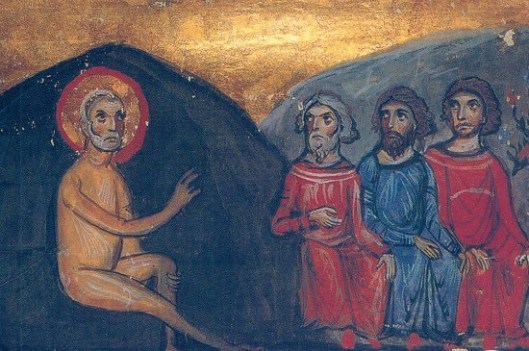 For Von Hildebrand, certain affective responses of the heart are always proper, even if, in the end, one does not act in accord with the feelings of the heart but in response to a contrary command of the will, as at times one must. We see this in Abraham, whose heart longed for his son’s life even as he chose to sacrifice him at God’s command. The righteous Job bemoaned his sufferings even as he submitted to God’s will. Most eminently, Jesus wept over his approaching passion — just as we would in the face of such imminent suffering — while he prayed, “not my will but thine be done.” Of course, Our Lord willed to feel this heart’s anguish, while such suffering comes upon us without our choice; yet, he would not have willed an affection for what the will forbade if it were wrong to feel it. His example in Gethsemane demonstrates that our affective response to God’s will need not be a stoic indifference to suffering or a feeling of pleasure that God’s purposes are being fulfilled. We may feel sadness at the death of a friend (as St. Paul said he would have at the passing of Epaphroditus, Philippians 2.27), even though we accept it as God’s will, or sorrow at the prospect of a God-ordained sacrifice of well-being and contentment.
For Von Hildebrand, certain affective responses of the heart are always proper, even if, in the end, one does not act in accord with the feelings of the heart but in response to a contrary command of the will, as at times one must. We see this in Abraham, whose heart longed for his son’s life even as he chose to sacrifice him at God’s command. The righteous Job bemoaned his sufferings even as he submitted to God’s will. Most eminently, Jesus wept over his approaching passion — just as we would in the face of such imminent suffering — while he prayed, “not my will but thine be done.” Of course, Our Lord willed to feel this heart’s anguish, while such suffering comes upon us without our choice; yet, he would not have willed an affection for what the will forbade if it were wrong to feel it. His example in Gethsemane demonstrates that our affective response to God’s will need not be a stoic indifference to suffering or a feeling of pleasure that God’s purposes are being fulfilled. We may feel sadness at the death of a friend (as St. Paul said he would have at the passing of Epaphroditus, Philippians 2.27), even though we accept it as God’s will, or sorrow at the prospect of a God-ordained sacrifice of well-being and contentment.
In a similar way, we may feel pity for the afflicted, even though we may judge their sufferings to fall within the determinations of a just and unerring Providence.
End Notes
11. S. Thomae Aquinatis, Summa Theologica, II-II, Q. XXX, Art. I
12. Ibid. I-II, Q. XXIV, Art. III
13. Ibid.
14. Ibid.
15. Vallgornera, R.P. Thoma a, OP, Mystica Theologia Divi Thomae, Tomus I, Quaestio II, Disputatio VII
16. Dietrich von Hildebrand, The Heart: An Analysis of Human and Divine Affectivity, p. 21
17. Ibid. pp. 21-26
Back in Hell
“Who is more arrogant
within his soul, who is more impious
than one who dares to sorrow at God’s judgment?”
We must now return to Virgil’s denunciation of Dante’s pity for the damned. From what we have said of the nature of the human soul and of pity, how will we respond to Virgil’s rebuke?
At first glance, the case for Dante’s defense, “Reader, how could I not?” does not appear strong.
We will recall St. Augustin’s definition of pity or mercy as “the compassion in our heart for another’s misery by which, indeed, we are impelled to give succor, if we are able.” Pity, it seems, is more than just heart’s compassion; it carries with it the desire to relieve the pain of those in misery. Yet, can such a response ever be proper in Hell? To want to relieve the suffering of the damned is to desire that they escape the just punishment of God. It is to want the overthrow of justice. Such a desire cannot be pity, but arrogant impiety.
Then, in discussing whether evil is the motive for mercy 18, St. Thomas agrees with an objection that crime or fault does not provoke mercy but rather indignation: Sed culpa non est provocativum ad misericordiam, sed magis indignationem. In reply to this objection, St. Thomas says, quod de ratione culpae est quod sit voluntaria; et quantum ad hoc non habet rationem miserabilis, sed magis rationem puniendi. (“To be voluntary is of the very meaning of fault; and to this degree, fault does not have the character of the pitiful but rather of something to be punished.”) If such is true of the fault itself, is it not equally true of the punishment it merits? It seems, then, that Dante’s heartless response to Filippo Argenti was the proper one, while the pity he showed to others among the damned was, as Virgil said, arrogant and impious.
Yet, such a judgment, based on what I have quoted from St. Thomas, would be rash. For, though in the same place he says that the voluntary character of a fault invites indignation rather than mercy, yet he says that fault is itself a punishment, 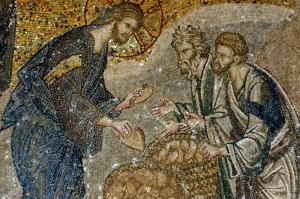 presumably because the sinner does not will the evil of the sin but some good he thinks he will attain by sinning: Sed quia culpa potest esse aliquo modo poena, inquantum scilicet habet aliquid annexum quod est contra voluntatem peccantis, secundum hoc potest habere rationem miserabilis; et secundum hoc miseremur et compatimur peccantibus… (“But because a fault is able to be in some measure a punishment, namely insofar as it has something annexed to it which is against the will of the sinner, on account of this it is able have the character of the miserable; and thus we show mercy to and have compassion for sinners.”) Sin itself is a wretchedness no one desires for its own sake, and it is this involuntary character of sin that makes the sinner the object of mercy. It is thus, as St. Thomas points out, that Jesus himself had pity on the throngs of sinners, “harassed and helpless, like sheep without a shepherd” (Matt. 9:36).
presumably because the sinner does not will the evil of the sin but some good he thinks he will attain by sinning: Sed quia culpa potest esse aliquo modo poena, inquantum scilicet habet aliquid annexum quod est contra voluntatem peccantis, secundum hoc potest habere rationem miserabilis; et secundum hoc miseremur et compatimur peccantibus… (“But because a fault is able to be in some measure a punishment, namely insofar as it has something annexed to it which is against the will of the sinner, on account of this it is able have the character of the miserable; and thus we show mercy to and have compassion for sinners.”) Sin itself is a wretchedness no one desires for its own sake, and it is this involuntary character of sin that makes the sinner the object of mercy. It is thus, as St. Thomas points out, that Jesus himself had pity on the throngs of sinners, “harassed and helpless, like sheep without a shepherd” (Matt. 9:36).
Of course, it was not sinners eternally damned that Jesus pitied. It was the living, those whom he could succor by binding their wounds and gathering them into the sheepfold of his Church. The damned are beyond all aid and thus, it seems, beyond the mercy and pity even of Christ.
In the passage cited above, however, St. Thomas says fault can elicit pity (hoc potest habere rationem miserabilis), not because the sinner is capable of being helped, but simply because sin in some measure is involuntary. Jesus, too, had mercy on the crowds because of their misery. Indeed, no one except Jesus had a more just cause to feel indignation at the sight of sinners; given the union of his intellect with the divine essence, he could not only behold the gravity of their sin but the justice of its punishment. Moreover, he could understand how the sufferings of sin, despite the sin, promote the workings of divine Providence toward the universal good. For none can thwart the will of God for the perfect consummation of the cosmos. Yet, Jesus felt pity for sinners simply on account of their wretchedness.
It seems, then, that it is a true pity that responds to suffering simply because, in some measure, it is involuntary. Of course, such a response would be merely emotional self-indulgence if one felt no desire to help the sufferer, if such help were possible. One can, however, imagine situations where such help would be misplaced — as when suffering would be for the benefit for the sufferer or where one sees that it is in accord with the will of God. In such cases, though we might feel a certain “misery of the heart” for the one suffering, we would submit any desire to relieve the suffering to the just determinations of the intellect.
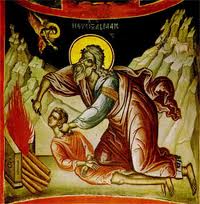 It is just such pity that Abraham must have felt for Isaac, whom God had commanded to the sacrifice. Abraham’s father’s heart could not but have felt a desire to preserve his son from death, yet Abraham submitted his pity to God’s command, which his intellect apprehended and his will enjoined. Abraham suffered the sharp pangs of pity, and indeed it was right that he felt them; for what father would he be whose heart did not bleed for his son in such a circumstance? Yet, Abraham suffered without giving way to disobedience. Likewise, in the Garden, Jesus felt anguish at the prospect of his coming passion and even asked, if it were possible, that this cup would pass from him. Yet, his determination was that of the just man who obeys, but suffers in his obedience: “Not my will but thine be done.”
It is just such pity that Abraham must have felt for Isaac, whom God had commanded to the sacrifice. Abraham’s father’s heart could not but have felt a desire to preserve his son from death, yet Abraham submitted his pity to God’s command, which his intellect apprehended and his will enjoined. Abraham suffered the sharp pangs of pity, and indeed it was right that he felt them; for what father would he be whose heart did not bleed for his son in such a circumstance? Yet, Abraham suffered without giving way to disobedience. Likewise, in the Garden, Jesus felt anguish at the prospect of his coming passion and even asked, if it were possible, that this cup would pass from him. Yet, his determination was that of the just man who obeys, but suffers in his obedience: “Not my will but thine be done.”
It seems, then, that Dante’s plea, “Reader, how could I not?” should elicit a sympathetic hearing. For if it is possible and even right for the just man in this life to feel pity for one who suffers while acquiescing in the suffering, could not Dante have the same response when he beheld the damned in Hell? That Beatrice and the angel felt no such pity does not argue against such a conclusion, for they belong to the number of the blessed, whom, as St. Augustin says, enjoy perfect felicity: Quoniam tunc non erit ipsa necessitas, sed plena, secura, sempiterna felicitas… Vera ibi gloria erit … Vera pax, ubi nihil adversi, nec a se ipso, nec ab alio quisquam patietur. 19 (“Because then there will not be need, but full, secure, and eternal felicity … There shall be true glory … True peace, where one shall suffer nothing contrary, neither from himself nor from another.”) Pity is a suffering, a “misery of the heart,” of which the blessed cannot partake, for they possess in God the fullness of joy. Dante, however, does not enjoy the vision of God that precludes all sorrow and so cannot respond like Beatrice or the angel did to the suffering of the damned.
Nor does the fact that Dante, in the Fifth Circle, feels indignation toward Filippo Argenti forbid his feeling pity for others in Hell. The propriety of pity at some times does not preclude indignation at others. Indignation is the fitting response to the voluntary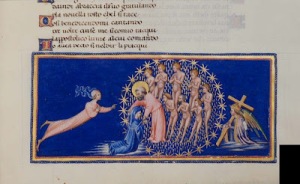 nature of sin just as pity is to its involuntary character as a punishment. Though sin is always voluntary, particular sins will partake more or less of the involuntary than others and so inspire either greater pity or greater indignation.
nature of sin just as pity is to its involuntary character as a punishment. Though sin is always voluntary, particular sins will partake more or less of the involuntary than others and so inspire either greater pity or greater indignation.
But if it is not unfitting that Dante feel pity for the damned, what are we to say of Virgil’s rebuke of Dante in Canto XX of the Inferno? Was Dante in the right and Virgil in the wrong? If this is indeed the correct interpretation, it is a surprising one. No where else does Dante portray Virgil thus. In the Purgatorio, we find Virgil seeking direction from others, but then he has passed beyond the realm of the merely natural. In Hell, however, Dante consistently portrays Virgil as the magister in whose wisdom he has implicit trust.
Yet, in anticipation of Virgil’s rebuke, Dante begs our sympathy — “how could I check my tears, when near at hand I saw the image of our humanity distorted…” It is almost as if he is trying to defend himself against Virgil — something Dante does not do anywhere else. Does Dante see some justice in his pity, even as he tacitly submits to Virgil’s superior judgment?
It is important here to note that Dante does not weep for fortune tellers and diviners as such but because he sees in them the “image of our humanity distorted.” We might say that here Dante weeps because he sees himself in the sufferers; for he is what they once were — a man. Dante’s pity here expresses what St. Thomas sees as a key aspect of misericordia — self love: Tristitia seu dolor est de proprio malo, intantum aliquis de miseria aliena tristatur aut dolet, inquantum miseriam alienam apprehendit ut suam. 20 (“Sadness or anguish is directed toward an evil proper to oneself, insofar as someone sorrows or feels anguish over another’s misery insofar as he apprehends it as his own.”) In other words, we sorrow for others because we see ourselves in them. Such sorrow arises in two ways, according to St. Thomas. The first is when we deem the other our friend, for a friend is another self. The second is when we realize that we are susceptible to suffer the same misfortune that weighs on another. In the case of sinners, it is the conviction that we can fall as they fell that inspires the pity we feel for them.
Thus, a possible interpretation of Canto XX would not see Virgil’s rebuke as directed toward all feelings of pity for the damned (for nowhere else does he rebuke Dante for such pity); rather, Virgil chastises Dante for failing to discern the sin of the Fourth Bolgia — a sin more deserving of indignation than of pity. It for this that he reckons Dante a fool. The damned souls of Canto XX are guilty of a particularly heinous form of fraud that seeks to usurp knowledge and power that belong to God alone and which he alone has the right to bestow. Such sinners cannot be Dante’s friends, nor is their sin of such a nature that one easily succumbs to it, like the sin of lust or the despair of the suicide. Necromancy and divination are fully deliberate sins, without any venial weakness of the flesh; those who suffer for such fraud more deserve indignation than pity. Thus, when Virgil says, “There is no place for pity here,” “here” means “among these sinners here” not Hell itself.
Yet, despite Virgil’s rebuke in Canto XX, when standing on the verge of Malebolge, where the worst of sinners are punished, Dante again feels pity:
Such shrieks and strangled agonies shrilled through me
Like shafts, but barbed with pity, that my hands
Flew to my ears…
(Inferno, Canto XXIX, 43-45)
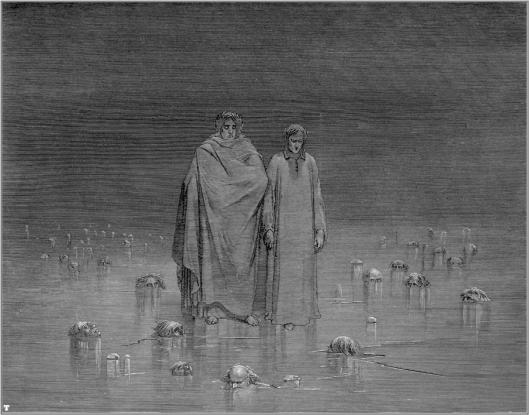 It is not that Dante fails to detect the gravity of the sin of treachery, punished in the ice of the Ninth Circle, for as we noted above, it is there that Dante savagely pulls out great handfuls of Bocca degli Abbati’s hair. It is, rather, that, despite the sin of treachery and the just indignation it inspires, there yet remains within him (as in the Fourth Bolgia) a feeling of common humanity that allows, nay, forces him to identify himself with even the worst of sinners. Not even indignation, then, can drown out pity, for even the most grievous sins do not utterly efface the image of God in man. Pity finally is the heart’s response to this inherent dignity that sin can deface and defile but never entirely obliterate.
It is not that Dante fails to detect the gravity of the sin of treachery, punished in the ice of the Ninth Circle, for as we noted above, it is there that Dante savagely pulls out great handfuls of Bocca degli Abbati’s hair. It is, rather, that, despite the sin of treachery and the just indignation it inspires, there yet remains within him (as in the Fourth Bolgia) a feeling of common humanity that allows, nay, forces him to identify himself with even the worst of sinners. Not even indignation, then, can drown out pity, for even the most grievous sins do not utterly efface the image of God in man. Pity finally is the heart’s response to this inherent dignity that sin can deface and defile but never entirely obliterate.
Pity cannot be silenced in the heart of the just man, even by the shrieking agonies of Hell, however justly deserved they may be by sinful man.
End Notes
18. S. Thomae Aquinatis, Summa Theologica, II-II, Q. XXX, Art. I
19. Sancti Augustini, De Civitate Dei, XXII 30,I, quoted in Enchridion Theologicum Sancti Augustini
20. S. Thomae Aquinatis, Summa Theologica, II-II, Q. XXX, Art. II
Dante and the German Reformaion
 In my novel, A Song for Else, I bring together what may seem incongruous themes — Dante and the German Reformation. If you are interested in seeing how I do this, click on the book’s cover for purchasing information.
In my novel, A Song for Else, I bring together what may seem incongruous themes — Dante and the German Reformation. If you are interested in seeing how I do this, click on the book’s cover for purchasing information.
A Song for Else currently comprises one part of a projected trilogy: The Vow. This volume takes the protagonist, Lorenz List, through the years immediately preceding the advent of the Protestant Reformation in Germany. The interested reader may purchase A Song for Else from the publisher, Arouca Press. By the way, the book may also be found on Amazon.com — though I encourage my readers to patronize my fine publisher, not Leviathan.
By the way, the layout of the book is as lovely as the cover art.
Annotated Bibliography
Dante Alighieri, The Divine Comedy, trans. by John Ciardi. New American Library, 2003. This is the primary version of the Divine Comedy from which I drew quotations and upon which I based my analysis.
Dante Alighieri, The Divine Comedy, trans. by John D. Sinclair. Oxford University Press, 1961. This text, which contains both the Italian original and an English prose translation, served as a point of comparison with Ciardi’s translation.
Aquinas, Thomas, Summa Theologica. Marietti, 1927. This was the primary source for the teaching of Aquinas. I drew from Prima Secundae, Q. 22-25 (De Passionibus), 77 (De Causa Peccati ex Parte Appetitus Sensitivi); and Secunda Secundae, Q. 30 (De Misericordia).
Vallgornera, R.P. Thoma a, O.P., Mystica Theologia Divi Thomae Utriusque Theologiae Scholasticae et Mysticae. Marietti, 1927. I used this work as a guide to Scholastic thought, particularly of Aquinas, on the passions. I drew from Disputatio VII, De Appetitu et De Passionibus Eius.
Enchiridion Theologicum Sancti Augustini, Franciscus Moriones, O.R. S.A., S.T.L., editor. Biblioteca De Autores Cristianos, Madrid, 1961. This text contains a passage from De Civitate Dei that is pertinent to a discussion of mercy and compassion in the saints.
Hildebrand, Dietrich von, The Heart, An Analysis of Divine and Human Affectivity, St. Augustine’s Press, South Bend, Indiana. 2007. This text discusses human affectivity and its relation to the intellect and will. I drew, especially, from Part III, “The Human Heart Transformed,” Chapter One, “The Heart of the True Christian.”

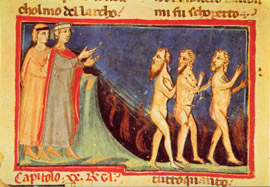
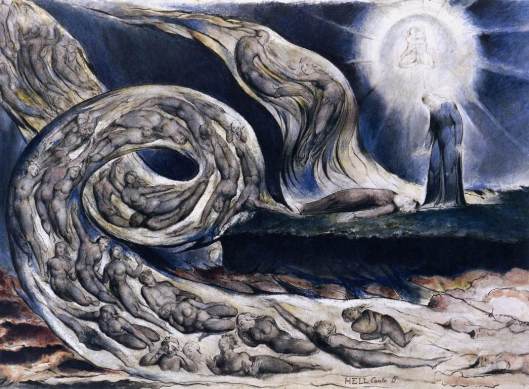
Chris,
The Dante essay is first-rate…a definite keeper.
Some thoughts. See Mark Musa’s translation and commentary for some sober reflections on Francesca.
And see Thomas’s claim that with respect to how we treat our fellows, mercy is greater than justice. (Portia’s speech agrees!)
On the heart see Spaemann’s Persons. He claims that only with the NT understanding of the heart do we come to recognize the nature of the person.
Best,
Jim Hanink
Jim,
Thanks, especially for the references. I shall especially look at Spaemann with interest.
Pax.
Reblogged this on Eclectic Orthodoxy and commented:
If you have read Dante’s Inferno, you will have noted Dante’s ongoing struggle with pity. Should one pity the damned, or should one hate them, perhaps even rejoice in their just sufferings? C. S. Lewis addressed this question in The Great Divorce, where he insisted that the sufferings of the damned cannot affect the happiness of the Blessed.
I quite sincerely enjoyed this essay . Not only was it thorough and rigorous , but it was certainly insightful . The nuance of the scale of indignation and pity was especially delightful to read like the unraveling of a mystery caper . Bravo . I have always wondered about the underlying mechanics of pity in the Inferno and this has helped to answer my questions .
I was pretty pleased to discover this great site. I need to to thank you for ones time just for this wonderful read!! I definitely appreciated every little bit of it and I have you bookmarked to look at new things in your blog.